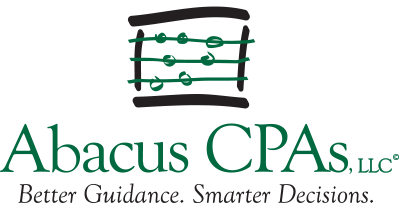
Business Entity Selection
Information & Advantages
Choosing the proper entity type is important when starting a business. Each entity option has its own set of rules. In order to make the right decision for your business Abacus CPAs is here to answer any questions you may have.
| QUESTION | SOLE PROPRIETOR (NO LLC) | SINGLE MEMBER LLC | MULTI-MEMBER LLC | SINGLE MEMBER LLC WITH S-CORP ELECTION |
|---|---|---|---|---|
| Is there an annual entity filing requirement? | No, all income from the business is taxed at the individual level. | Yes & No. For federal tax purposes all income from the business is taxed at the individual level & no separate filing is required. Some states require and annual return for the LLC. | Yes, all income and expenses from the business are filed on Form 1065. As a result of the 1065 return, a K–1 will report the individuals’ income that will then need the be reported on the individual tax return. | Yes, all income and expenses from the business are filed on Form 1120S. As a result of the 1120S return, a K–1 will report the individuals’ income that will need the be reported on the individual tax return. |
| Is tax liability generated at the entity level? | No, all taxes are assessed at the individual level. | No, all taxes are assessed at the individual level. | No, each partner’s share of the income is assessed on their individual tax return. | Yes & No. The shareholders’ profit is assessed on the individual tax return; however, payroll taxes which are required are paid by the entity. |
| Do I pay myself a wage? | No, the business owner is not allowed to pay themselves a wage. | No, the business owner is not allowed to pay themselves a wage. | No, the partners of the business are not allowed to pay themselves a wage. | Yes, the shareholder must pay themselves a reasonable wage. |
| Do I have any business liability protection? | No, if a business liability puts the business in jeopardy there is little to no protection for the business owner. | Yes, if a business liability puts the business in jeopardy there are some limits to how the liability may affect the business owner. | Yes, if a business liability puts the business in jeopardy there are some limits to how the liability may affect the business partners. | Yes, if a business liability puts the business in jeopardy there are some limits to how the liability may affect the shareholder. |
| Am I subject to self–employment tax? | Yes, net profits from the business are subject to self-employment tax. | Yes, net profits from the business are subject to self-employment tax. | Yes, the partners’ net profits from the business are subject to self-employment tax. | Yes & No. The shareholders’ net profits from the business are not subject to self-employment tax. However, a portion of the self-employment tax is paid on wages. |
| Can my business have more than one owner? | No, as a sole proprietor the business may only have one owner and all profits are distributed to that owner. | No, as a single member LLC the business may only have one owner and all profits are distributed to that owner. | Yes, as a multi-member LLC there must be at least two partners and the Partnership Operating Agreement will designate how profits are allocated. | No, since the LLC was created as a single member LLC, it is limited to one shareholder. However, if the LLC is modified it may have additional shareholders. |
1. Multi-member LLCs among married couples living in community property states who file jointly are not required to file Form 1065.
2. Consult a lawyer for specifics regarding legal matters.
3. Modifications to an LLC may require additional filings both on the State and Federal level. An accountant and lawyer should be consulted with for additional information.
Which Type of Business Entity is Right for Me?
Choosing the proper entity type is important when starting a business. Each entity option has its own set of rules. In order to make the right decision for your business Abacus CPAs is here to answer any questions you may have.
| Sole Proprietorship (no LLC) |
|---|
A sole proprietorship consists of one individual who carries on an unincorporated trade or business. It is the easiest business to organize. Intermingling of business and personal funds is allowed, but not recommended. Business income is reported on a Schedule C, which is part of the owner’s Federal Income Tax Form 1040.
Advantages:
- Minimum legal restrictions
- Easy to discontinue
Disadvantages:
- Unlimited Liability
- May not bring in new owners or outside capital
| Single Member Limited Liability Company (LLC) |
|---|
An LLC is a liability–limiting entity formed under state law. It is disregarded for tax purposes. Like a sole proprietorship, business income is reported on s Schedule C of the single member’s (owner) Federal Income Tax Form 1040.
Advantages:
- Limited Liability Protection for owner without all the expense and complexity of a corporation
- Avoids many of the restrictions that corporations have
- Avoids double taxation of profits that is possible with a corporation
- Relatively simple and inexpensive to set-up and maintain
Disadvantages:
- Inconsistent Treatment State to State
- New type of entity so case law and state statute/regulations are limited
| Multi–Member Limited Liability Company (LLC) |
|---|
Very similar to a single member LLC in that it has the liability protection for each member (partner), but has all the other characteristics of a partnership. See below for additional information regarding partnerships.
| Partnership |
|---|
A partnership is an organization having two or more owners that functions as a trade or business. A joint undertaking merely to share expenses or ownership of property does not necessarily constitute a partnership. Partnership income and expense flow through to the partners. Income is taxed to the partner whether or not it is distributed to the partner. A partnership is easy to organize. A written partnership operating agreement is strongly recommended.
Advantages:
- A partnership combines the skills and/or financial abilities of several people
- Easy to Establish
- Business usually benefits from partners who have complimentary skills
Disadvantages:
- A partnership is often easier to get into than out of
- Partners are liable for actions of the other partners (unlimited liability)
- Sharing of profits
- Disagreements in decision making
| C–Corporation |
|---|
A corporation is a business entity formed under state law that carries its own legal status, separate and distinct from its owners. A C–Corporation pays tax on its profits. When shareholders take profits from the corporation, the distributions are usually taxable dividends (double taxation). Shareholders who perform services for a corporation must be treated as employees. Wages to shareholder/employees must be reasonable.
A corporation is difficult and expensive to organize. Corporations must hold periodic board meetings and keep meeting minutes. Corporations must comply with federal and state regulations.
Advantages:
- Limited Liability
- Perpetual Life
- Ease of Ownership Transfer
Disadvantages:
- Double Taxation of Profits
- Subject to Various State and Federal Law
- Difficult and Expensive to Organize and Maintain
| S–Corporation |
|---|
A corporation can elect with the IRS to be taxed as an S–Corporation which is similar to a partnership. Income and expenses flow through to the shareholders eliminating double taxation. An employee shareholder of an S–Corporation must still receive wages for services rendered and the wages must be reasonable.
Advantages:
- Limited Liability
- Perpetual Life
- Avoids Double Taxation of Profit
- Profits Passed Through are not Subject to Self-Employment Tax as in a Partnership
Disadvantages:
- Shareholders Pay Tax on Earnings Even if the Profit is Undistributed
Business Entity Formation
Whether you are creating a new business or registering an existing one in the state of Missouri, Abacus CPAs can assist you with creating a Limited Liability Company (more commonly referred to as an LLC).
The main the reason you should consider forming an LLC is to separate your business assets from your personal assets.
Registered Agent Services
The Missouri Secretary of State’s office states that any active Missouri-based business is required to have a Registered Agent located in the state of Missouri. A Registered Agent is defined as person or business who is available Monday – Friday 8:00 am – 5:00 pm and can accept/receive any documents that may be served on your business.
If you are in need of a Registered Agent for your Missouri-based business, contact Abacus CPAs at 417-380-5000.



